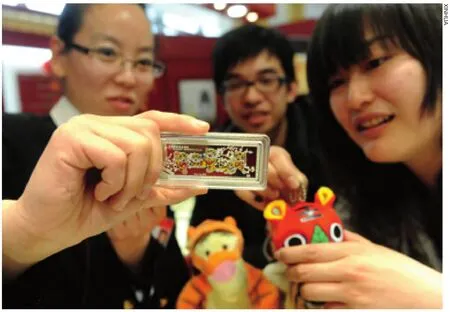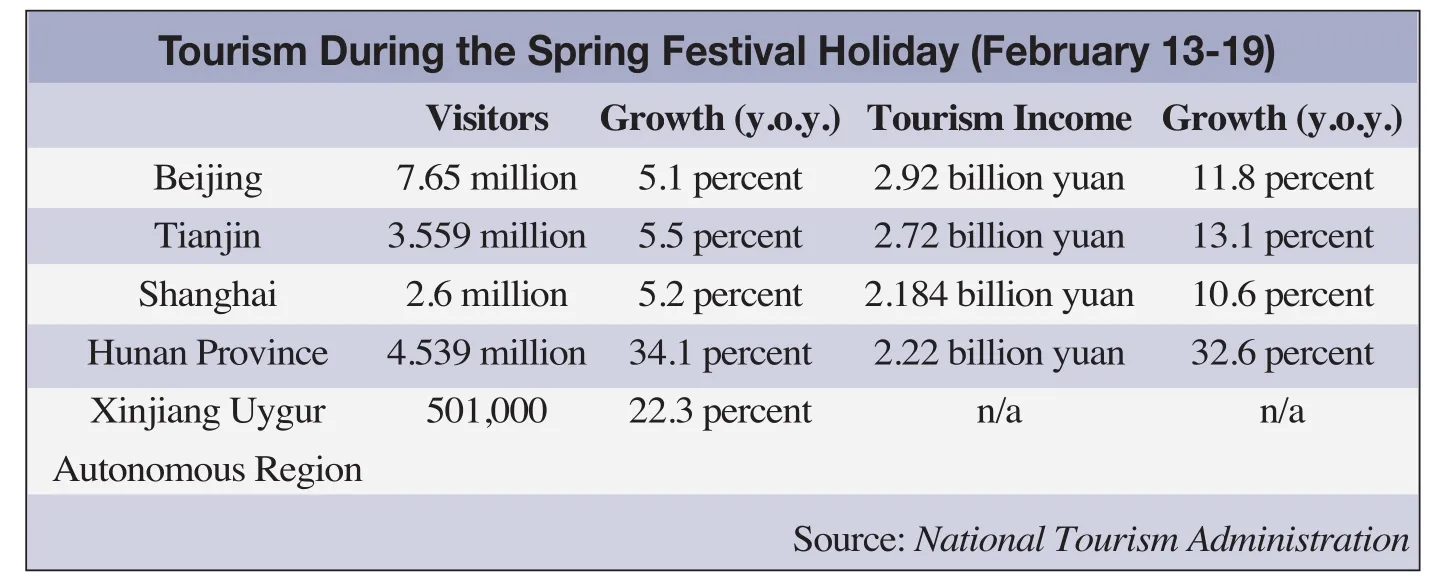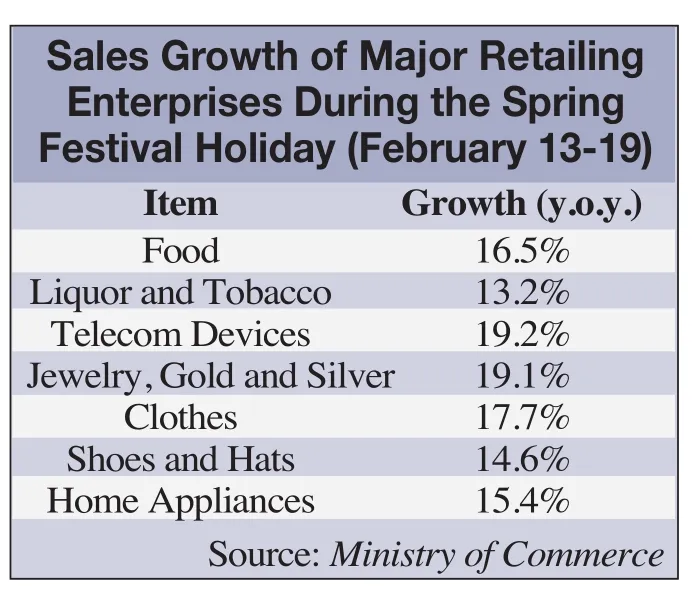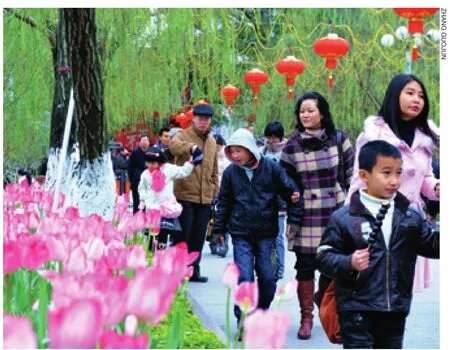Spring Spending
Consumer purchases increase during the holiday of Chinese New Year, but are unlikely to be sustained for the rest of the year

GO FOR THE GOLD: A customer looks at gold products in Beijing. Gold has become a popular item for gift giving during the Spring Festival holiday
By LIU XINLIAN
Beijing housewife Jian An and her family spent 8,563 yuan ($1,260)during the Spring Festival holiday(February 13-19), which was even higher than her monthly earnings. And half of the spending went on a new digital camera. “It is reasonable because the Spring Festival—the Chinese Lunar New Year—is the most important festival of the year,” Jian said.
Jian’s holiday spending was far from being called lavish or luxurious—it actually falls at an intermediate level among her friends. “One of my friends spent nearly 20,000 yuan ($2,941),” said Jian.
According to the Ministry of Commerce,China realized retail sales on consumer goods of 340 billion yuan ($50 billion) during the seven-day holiday, a robust increase of 17.2 percent year on year.
Traditional festival goods, including food, beverages, catering, liquor, tobacco,fireworks, jewelry, clothing and household appliances all witnessed a rapid surge in sales, said the ministry. Shoppers also took to the Internet in search of deals. Hangzhoubased Taobao.com, the biggest online shopping website in Asia, from February 14 to 17, scored business volume of 1 billion yuan ($147 million).
While family reunions enjoyed priority among the multitude of Spring Festival traditions, a growing number of Chinese people used the holiday as an opportunity to travel.The National Tourism Administration said spending on tourism reached 208 million yuan ($30.6 million), a year-on-year increase of 23.1 percent.
Whether the holiday spending spree will start a new surge in consumption for the rest of the year, however, is uncertain.
A holiday frenzy
“Although consumer goods sales [during the Spring Festival] were at a record high this year, we cannot tell if it would drive the economic growth in a real sense,” said Cai He, a sociology professor at Guangzhoubased Sun Yat-Sen University.
“People who are not willing to spend or dare not spend normally all buy things for the festival,” said Cai. “It is a tradition for the Chinese, rich or poor.” In this sense, the Spring Festival market surge is bound to happen annually.
While income remains unchanged, the soaring Spring Festival spending will undermine post-holiday consumption since the consuming capability of people has been overdrawn by the short holiday, Cai said.
This year’s growth rate for gross retail sales of consumer goods might be a little lower than that of 2009, said Fan Jianping,a senior analyst at the State Information Center, a key government think tank. The effects of government stimulus measures on consumption this year will gradually decrease as a result of a sudden spending boom last year,Fan said.
Wang Yuehun, chief economist of MasterCard Asian-Pacific, agreed with Fan. The explanation for the consumption surge last year is simple—government subsidies provided the necessary boost,Wang said. “Obviously, it is not sustainable.”
Meanwhile, the lack of income growth to push forward consumption in a sustainable manner could also harm future spending sprees. “As we all know, consumption is decided by income, and the much slower income growth compared with consumption last year will make the consumption increase this year lack momentum, said Zhou Xiaozhi, Deputy Director of the research department at China Construction Bank.
In 2009, China realized gross retail sales of consumer goods of 12.5 trillion yuan ($1.83 trillion), an increase of 15.5 percent year on year. By sharp contrast,the per-capita disposable income for urban residents increased by only 9.8 percent.Rural residents’ income increased 8.5 percent, said the National Bureau of Statistics(NBS).
A good start


Of the three major forces driving the Chinese economy, consumption has long been considered the least reliable compared with exports and investment. Last year, while the export sector, shattered by the world financial crisis, crippled GDP growth by dragging down 3.9 percentage points, government-stimulated consumption pushed it up by 4.6 percentage points.It is still much lower than investment,which contributed 8 percentage points to the 8.7-percent GDP growth, said the NBS.
As a result of an imperfect social security system, average Chinese people are still buttoning down their pockets and making every cent count in spite of every effort the country has made to stimulate consumption.
This year, the country will implement more policies to improve social security to ease their saving anxieties.
China will raise pensions for enterprise retirees nationwide and allow employees to transfer their pension accounts when they move between provinces, said the State Council last December. At an executive meeting presided over by Premier Wen Jiabao, the State Council decided to raise the pension by about 10 percent from the 2009 level, or 120 yuan ($17.57) a month per person, starting on January 1, 2010. It is the fi fth consecutive year that China has raised basic pension payments for enterprise retirees since 2005.
Many provinces and cities have decided to raise the minimum wages this year as the economy picks up and the government seeks to boost incomes. The wealthy coastal province of Jiangsu will increase its minimum wage by at least 12 percent in February. In Nanjing, capital of Jiangsu Province, the minimum monthly salary will be increased to 960 yuan ($141) from the current 850 yuan ($125).
Beijing may raise the minimum wage by 10 percent from the current 800 yuan($117.6) per month as early as April 1, and Zhejiang Province, as well as Dongguan and Guangzhou in Guangdong Province,also plan to implement minimum wage raises.
With the adjustment in national income distribution, the Chinese Government is increasing its investment to improve people’s livelihoods, a favorable condition for expanding domestic consumption, said Fan Jianping.
Given the positive influence last year’s incentive policies on consumption in rural areas have exerted, the Chinese Government has decided to broaden and extend them this year.
A government-funded scheme will be initiated to expand building material sales in the countryside and encourage farmers to build better houses, said the No.1 Document released jointly by the State Council and Central Committee of the Communist Party of China on January 31, 2010.
The building materials for the countryside will bring about a demand of more than 700 billion yuan ($102.9 billion), said an analysis report by China Securities Co. Ltd.
The Central Economic Work Conference and the State Council executive meeting held in December 2009 has sent out policy signals that consumption incentive policies will continue and be enhanced this year.
The China Economic Annual Outlook Report 2010 released on March 1 by the Beijing Technology and Business University estimated that China’s consumption can grow by 18 percent this year, propped up by a recovery of the world economy and a continuous domestic growth.
China’s consumption ratio has been much lower than that of advanced countries,leaving great potential for improvements and substantial increases, said Zhang Wei, an analyst at Fortune Securities. ■

FESTIVAL WALK: Tourists visit the West Lake Garden in Fuzhou, capital of Fujian Province, during the Spring Festival. During the week-long holiday,Fujian realized a tourism income of 2.85 billion yuan ($419 million),up 17.6 percent compared with figures from 2009

